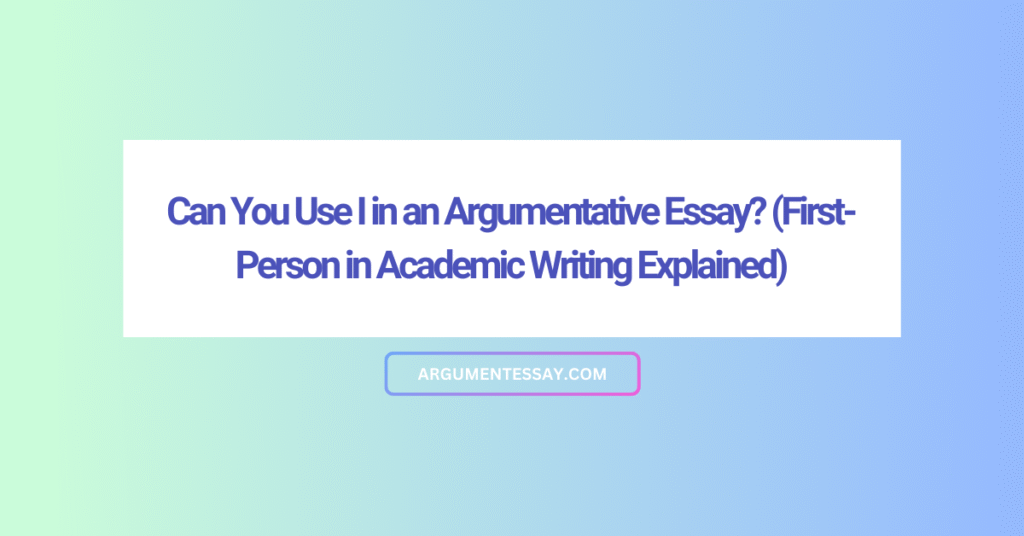When writing an argumentative essay, one common question many students face is: Can you use I in an argumentative essay?
Some instructors say yes, others strongly discourage it — leaving you confused about whether you should write from the first-person perspective or not.
In this guide, we’ll break down exactly when it’s appropriate to use “I,” why it’s sometimes discouraged, and what to use instead if you need a more formal tone. Let’s clear up the confusion once and for all.
Can You Use I in an Argumentative Essay?
The short answer is: Yes, but it depends.
In many cases, especially in academic settings, using “I” in an argumentative essay is acceptable — if it helps clarify your argument or reflect your reasoning. Certain writing styles, like APA and MLA, do not strictly forbid using the first person. In fact, APA style even encourages first-person pronouns when discussing personal reflections or explaining your research process.
However, always check your professor’s or school’s specific guidelines. Some academic environments prefer essays to sound entirely objective, which means avoiding “I” altogether.

Why Some Teachers Advise Against Using “I”?
Even though it’s not always banned, many instructors discourage using “I” because it can make your argument seem subjective rather than objective.
In an argumentative essay, your goal is to persuade readers with evidence and logic — not just personal opinion. Using “I think” or “I believe” too often can weaken your credibility, making your claims sound like personal feelings instead of well-supported arguments.
Additionally, overusing the word “I” can make your writing feel repetitive and less formal, which may lower your academic tone.
When It’s Okay to Use “I” in an Argumentative Essay
There are times when using I in an argumentative essay is not only acceptable but actually strengthens your writing.
For example:
- When presenting personal experience as evidence (“I have witnessed firsthand the effects of climate change…”)
- When clarifying your reasoning or your stance (“I argue that stricter regulations are necessary because…”)
- When acknowledging limitations or biases (“I recognize that my background in urban studies influences my perspective…”)
Used strategically, first-person writing can make your argument more relatable and persuasive.
What to Use Instead of “I” in an Argumentative Essay
If you’re aiming for a more formal, objective tone — or if your instructor specifically says to avoid “I” — there are several alternatives you can use:
1. Use Passive Voice (Carefully)
Instead of: “I found that…”
Use: “It was found that…”
(But don’t overdo passive voice — too much can make writing confusing.)
2. Use Third-Person Constructions
Instead of: “I argue that…”
Use: “This essay argues that…”
Or: “Research indicates that…”
3. Focus on Evidence Rather Than Personal Opinion
Instead of: “I think climate change is a threat,”
Say: “Climate change poses a significant threat, as shown by recent studies.”
Quick List: Alternatives to I in an Argumentative Essay
Here’s a simple cheat sheet to replace “I” naturally:
- “The evidence suggests…”
- “According to research…”
- “It is evident that…”
- “This paper argues…”
- “Studies have shown…”
- “An analysis of the data reveals…”
Use these phrases to keep your writing strong and objective without relying on first-person pronouns.
1. Can you use the word “I” in an argumentative essay?
Yes, you can use “I” in an argumentative essay if it fits the assignment’s tone and guidelines. Some styles like APA allow first-person writing when it clarifies reasoning or reflects personal experience.
2. Should I avoid using “I” in academic writing?
In many academic essays, it’s better to avoid “I” to maintain an objective tone. Instead of personal opinions, focus on presenting evidence, research findings, and logical arguments.
4. When is it appropriate to use first-person in an argumentative essay?
Using the first person is appropriate when sharing personal experiences as evidence, explaining your reasoning, or acknowledging potential biases — as long as it enhances clarity and credibility.
3. What are good alternatives to using “I” in an essay?
Good alternatives include phrases like “The evidence suggests,” “Research shows,” “This paper argues,” and “It is evident that.” These maintain formality while strengthening your arguments.
